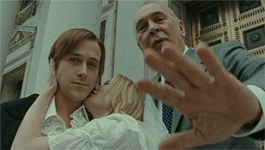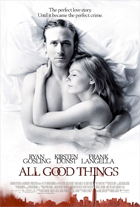All Good Things
|  In All Good Things Ryan Gosling plays a troubled young man named David Marks, a thinly veiled stand-in for real-life New York real estate heir Robert Durst, whose story is so bizarre and unlikely that screenwriters Marcus Hinchey and Marc Smerling couldn’t have made it up without being accused of implausibility. Like all cinematic treatments of real-life stories, there is plenty of recreation, speculation, and conjecture, especially regarding criminal elements of the Durst saga that have never been solved. However, the basic bones of the plot stick close to the actual events that unfolded over a three-decade period, from the early 1970s to the early 2000s (it helps that director Andrew Jarecki and Smerling have been researching the actual case since 2005). Like Robert Durst, David Marks is the oldest son of a real estate tycoon, in the film named Sanford Marks, (Frank Langella) who owns much of Times Square in downtown New York City. Ever the domineering and controlling patriarch, Sanford wants David to join the family business when he graduates from college, but David is resistant, choosing instead to forge his own path (albeit with his father’s money), which in this case means marrying a middle-class girl named Katie (Kirsten Dunst) and moving with her to Vermont to start a health food store. It doesn’t last, and David eventually succumbs to his father’s pressure, agreeing to move with Katie back to the Big Apple and take on his appointed role in the family business. Although a large chunk of Times Square is their greatest asset, the Marks also own a number of slum buildings that cater to prostitutes, drug dealers, and porn theaters, and one of David’s assignments is to collect the rent, thus suggesting that there is already a core of corruption in his genes. From there, the story begins to take a series of dramatic turns, as David and Katie’s marriage starts to buckle and then deteriorate as David becomes increasingly unhinged. He communicates very little with Katie, and when he does it is often violently, followed by sullen apologies. He mumbles to himself at times, and his look becomes increasingly vacant, as if he exists deep inside his own body and can only barely peer out. Dunst plays Katie as an intelligent, resourceful young woman who is increasingly disillusioned by her marriage, yet refuses to escape from it, partially because she would be left with nothing. Gosling, on the other hand, sinks deep into a state of abstract interiority, given us a nearly blank surface that is clearly hiding something, although the exact nature of what that is is left frustratingly vague. The changes in his character from the beginning of the film to the end are unnerving, as he goes from what appears to be a willful, adventurous young man to a closed-off shell who engages in increasingly bizarre behavior. For those not familiar with the facts of the actual case, I will not reveal more except to say that the David’s story eventually devolves in multiple murders, several of which have never been solved, although the film presents its own version of what happened. Director Andrew Jarecki, making his feature film debut after the well-received documentary Capturing the Friedmans (2003) about a Long Island family torn apart by accusations of child sexual molestation, has a difficult task in balancing the story’s sordid, bizarre elements with an obvious desire to breathe life into the characters, making them more than simple pawns in a complex mystery. He succeeds to varying degrees, as both Gosling and Dunst’s characters certainly capture the imagination, if for entirely different reasons. Much of the film takes place in the 1970s, and the period detail gives the story an extra chill, as everything from Mark’s square glasses and striped sweaters to the angular, modernist lake house at which they spend the weekends seems slightly off. Screenwriters Marcus Hinchey and Marc Smerling rely on a couple of narrative tricks to keep us slightly off-balance, including a series of seemingly unrelated shots in which a woman dumps heavy garbage bags off a bridge into the ocean and a fragmented voice-over narration that comes from a much older David Marks testifying for unknown reasons at a trial. Given the captivating and disturbing nature of the events on which it is based, All Good Things can’t help but draw us in, although one wishes that Jarecki had found a way to make it more than surface intrigue. Simmering beneath the surface are all kinds of questions about power and wealth and the cyclical nature of familial tragedy, and while they break through from time to time, it is never enough to give the film more depth than a TrueTV documentary would have delivered. Copyright ©2010 James Kendrick Thoughts? E-mail James Kendrick All images copyright © Magnolia Pictures |
Overall Rating: 

 (2.5)
(2.5)


